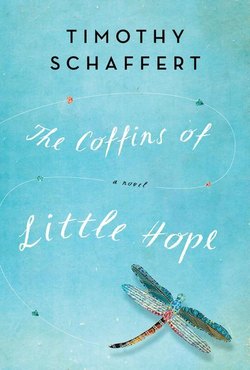Читать книгу The Coffins of Little Hope - Timothy Schaffert - Страница 18
На сайте Литреса книга снята с продажи.
· 11 ·
ОглавлениеThe farm on which the girl Lenore was said to have lived was a patchwork of agricultural projects: minor orchards and mostly fruitless gardens. A forest of evergreens, intended for Christmas, trudged up one side of a low hill and down the other, each tree long since too big for any house. Daisy’s father had planted them, and he’d died before they’d grown. The trees’ branches stretched up and out, the air around them thick with the medicinal gin-scent of juniper. Back when the evergreens had been right-sized for a holiday, no families in parkas had come with their little axes, so the trees, unsold, continued to grow and grow, overgrowing any potential, darkening the paths of dry needles beneath them.
And along a trellis, a vineyard had perished, the plants choked one summer by the herbicides carried over on the wind from a neighboring farm. Now all that remained were the knobby sticks of dried vines.
A narrow plank that hung from a few thin chains at the farm’s entrance bore the name of the farm—the Crippled Eighty—which had been burned into the wood, in that shivery, lasso-like, cowboy cursive, with a wood-burning kit by Daisy’s father. But the farm had actually been named, in mockery, by Daisy’s mother, long before Lenore was even born (if, indeed, she’d been born at all). “Nothing will grow,” the woman had told her husband. “It’s eighty acres of hills,” she’d said. She hadn’t even looked at the landscape as she’d stood in the sun, squinting instead at her reflection in a small mirror, the glass of it dusted with aspirin that had broken at the bottom of her pocketbook. She’d dabbed on lipstick as she’d spoken. “You bought the only acreage within miles that doesn’t have an inch of flatness. What are you going to do? Grow olive trees?”
But the land, uncrippled after all, had come to life for Daisy’s father, and for thirty years there’d been a lush harvest of corn one summer, beans the next, then corn again; there’d been cattle, hogs, chickens, eggs, milk. There’d been pasture choked with musk thistle and a narrow creek that had always made Daisy think of the baby Moses shoved off in a thatched basket. At least that was how things had been before Daisy’s mother had left the farm.
Daisy, a woman none of us had known at all well, told all this to Doc. She trusted Doc to tell her story. From the very beginning, she confided in him, and as Doc featured her on his front page week after week, and as the newspaper gained new subscribers not just from the region but from far beyond, far even outside the United States, his was the voice most closely associated with the facts and fictions of Lenore’s disappearance. While other writers from other towns approached the subject with big-city insensitivity, their every word a coy wink, Doc lent Lenore a beating heart.
Lenore’s absence only days old, Daisy took Doc on a tour of the farm. Here, she told him, was a stump where Lenore sat and startled spiders and let them bite her so she could watch the effect of their venom; here was Lenore’s own patch of garden, where she tried to grow things no one else in the local countryside grew, from seeds sent in the mail and fertilized with bat guano: tomatillos as hard and bitter as green apples; a Mexican melon with thorns on its skin. Tiny, foreign tomatoes, still plentiful on the vine that July afternoon, tasted like mango.
Nonetheless, the County Paragraph gave voice to its share of skeptics. Spiders bit her! a local wrote in a letter published on the Letters page. Lenore wasn’t kidnapped! She died! Daisy buried her in the pasture! Take a shovel and turn up that garden of exotic vegetables, and you’ll find Lenore’s corpse!
